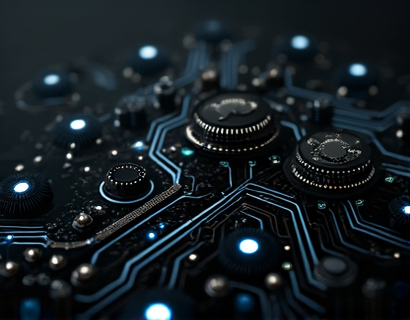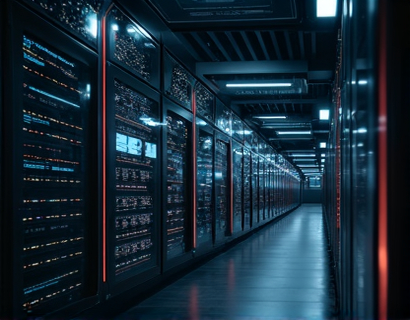Autonomous AI Agents: Revolutionizing Business Efficiency with Cross-Blockchain and Multi-Technology Automation
In the rapidly evolving digital landscape, businesses are constantly seeking innovative solutions to enhance efficiency, reduce costs, and gain a competitive edge. One of the most transformative technologies emerging to address these needs is the integration of Autonomous AI Agents across multiple blockchains and technologies. These agents are not just simplifying tasks; they are revolutionizing the way businesses operate by automating complex processes and optimizing workflows with advanced AI solutions.
The concept of Autonomous AI Agents involves deploying intelligent systems that can operate independently, making decisions and performing tasks without human intervention. These agents are designed to seamlessly integrate across various blockchain networks and other technological platforms, creating a cohesive and efficient ecosystem. The ability to cross-blockchain and multi-technology automation is particularly significant as it allows businesses to leverage the strengths of different systems, breaking down silos and enhancing overall operational efficiency.
Understanding Autonomous AI Agents
Autonomous AI Agents are sophisticated systems that combine elements of artificial intelligence, machine learning, and robotics process automation. These agents are programmed to perform a wide range of tasks, from data analysis and reporting to complex decision-making and process execution. The key feature of these agents is their autonomy, which enables them to adapt to changing conditions and learn from experiences, improving their performance over time.
One of the primary advantages of Autonomous AI Agents is their ability to handle repetitive and time-consuming tasks with high accuracy and speed. This not only reduces the workload on human employees but also minimizes the risk of errors, leading to higher quality outcomes. For instance, in financial services, these agents can automate compliance checks, transaction processing, and risk assessment, ensuring that all regulatory requirements are met efficiently and effectively.
Cross-Blockchain Integration
Blockchain technology has been a game-changer in terms of security, transparency, and decentralization. However, the fragmented nature of different blockchain platforms often leads to interoperability challenges. Autonomous AI Agents bridge this gap by enabling seamless communication and data exchange across multiple blockchain networks. This cross-blockchain integration is crucial for businesses that operate in industries where multiple blockchain solutions are used, such as supply chain management, healthcare, and finance.
For example, in a supply chain scenario, an Autonomous AI Agent can monitor products as they move through various blockchain-based systems, from production to distribution and final sale. The agent can automatically verify transactions, update inventory levels, and trigger alerts for any discrepancies or issues. This level of integration ensures real-time visibility and control, reducing delays and enhancing trust among all parties involved.
Multi-Technology Automation
Beyond blockchain, Autonomous AI Agents can integrate with a wide array of technologies, including cloud computing, Internet of Things (IoT), and traditional enterprise systems. This multi-technology automation creates a comprehensive automation framework that can address diverse business needs. By leveraging the strengths of different technologies, businesses can build more resilient and flexible operations.
In manufacturing, for instance, an Autonomous AI Agent can coordinate data from IoT sensors on the factory floor, cloud-based storage solutions for data analytics, and ERP systems for inventory management. The agent can analyze real-time data to optimize production processes, predict maintenance needs, and ensure that supply chains are well-stocked. This holistic approach not only improves efficiency but also enhances the overall quality of products and services.
Benefits of Autonomous AI Agents
The implementation of Autonomous AI Agents brings a multitude of benefits to businesses. One of the most significant advantages is the substantial increase in productivity. By automating routine and repetitive tasks, employees can focus on higher-value activities that require human creativity and critical thinking. This shift not only boosts productivity but also enhances job satisfaction and employee engagement.
Another key benefit is cost reduction. Autonomous AI Agents can significantly lower operational costs by minimizing the need for manual intervention, reducing errors, and optimizing resource utilization. For example, in the healthcare sector, these agents can automate administrative tasks such as appointment scheduling and patient data management, freeing up staff to focus on patient care. This not only reduces labor costs but also improves patient satisfaction.
Moreover, Autonomous AI Agents enhance decision-making processes through advanced analytics and predictive insights. By processing vast amounts of data in real-time, these agents can identify trends, forecast outcomes, and provide actionable recommendations. This data-driven approach enables businesses to make more informed decisions, reducing risks and increasing the likelihood of success.
Case Studies and Real-World Applications
Several industries have already begun to harness the power of Autonomous AI Agents, achieving remarkable results. In the logistics sector, companies like Maersk and IBM have collaborated to develop blockchain-based platforms that use AI agents to streamline shipping processes. These agents automate customs clearance, document verification, and route optimization, leading to faster and more reliable delivery services.
In the financial industry, firms such as JPMorgan Chase have implemented AI-driven agents to automate trade processing and compliance checks. These agents can handle thousands of transactions per day with precision and speed, significantly reducing the time and resources required for manual processing. This not only improves efficiency but also enhances the security and accuracy of financial operations.
In the retail sector, businesses are using Autonomous AI Agents to optimize inventory management and customer service. These agents can analyze sales data, predict demand, and automatically adjust inventory levels. Additionally, they can handle customer inquiries and support tasks, providing 24/7 assistance and improving customer satisfaction.
Challenges and Considerations
While the potential benefits of Autonomous AI Agents are substantial, there are also challenges and considerations that businesses must address. One of the primary concerns is the initial investment required to implement these systems. Developing and deploying autonomous agents involves significant upfront costs, including technology acquisition, integration, and training.
Another challenge is ensuring the security and privacy of data. As these agents operate across multiple platforms, they handle sensitive information that must be protected from cyber threats. Businesses must invest in robust security measures and comply with relevant regulations to safeguard their data and maintain customer trust.
Interoperability and standardization are also critical issues. Different blockchain platforms and technologies may have varying protocols and standards, making seamless integration challenging. Industry collaboration and the development of universal standards can help overcome these barriers, fostering a more connected and efficient ecosystem.
Future Trends and Innovations
The future of Autonomous AI Agents is promising, with ongoing advancements in AI, blockchain, and other technologies set to enhance their capabilities. One area of focus is the development of more sophisticated machine learning algorithms that can improve the decision-making and adaptability of these agents. As AI becomes more advanced, agents will be able to handle even more complex tasks and operate with greater autonomy.
Another trend is the integration of edge computing, which allows data processing to occur closer to the source, reducing latency and improving real-time responsiveness. This combination of edge computing and Autonomous AI Agents can lead to more efficient and responsive automation solutions, particularly in industries like manufacturing and IoT.
Furthermore, the rise of decentralized autonomous organizations (DAOs) is opening new possibilities for how these agents can be deployed and managed. DAOs can provide a governance framework for autonomous systems, enabling decentralized decision-making and collaboration among multiple stakeholders. This approach can enhance transparency, accountability, and trust in automated processes.
Conclusion
Autonomous AI Agents represent a significant leap forward in business efficiency and automation. By seamlessly integrating across multiple blockchains and technologies, these agents are transforming the way businesses operate, enabling them to maximize productivity, reduce costs, and gain a competitive edge in the digital landscape. While there are challenges to overcome, the potential benefits are immense, making this technology a crucial investment for forward-thinking organizations.
As the landscape continues to evolve, businesses that embrace Autonomous AI Agents will be well-positioned to thrive in an increasingly automated and interconnected world. The future of work is autonomous, and those who lead the way will reap the rewards of enhanced efficiency and innovation.










































